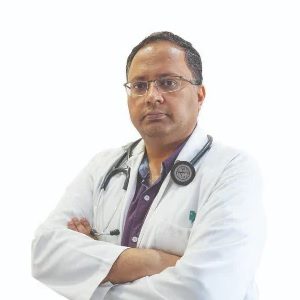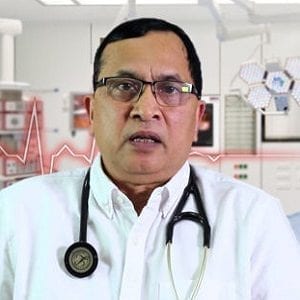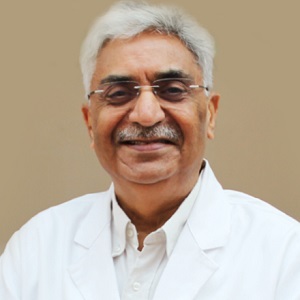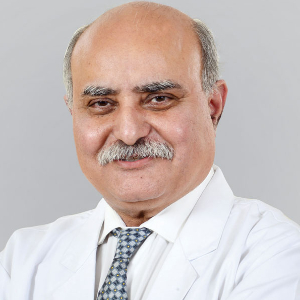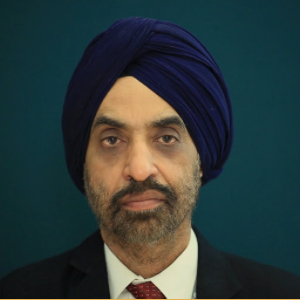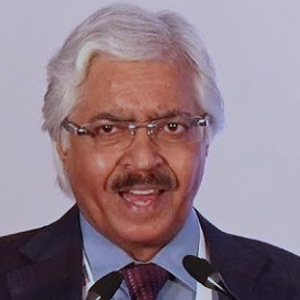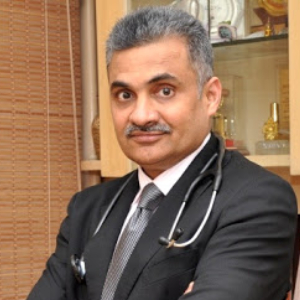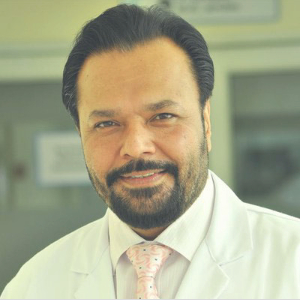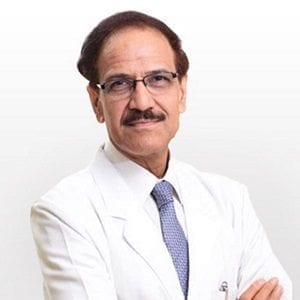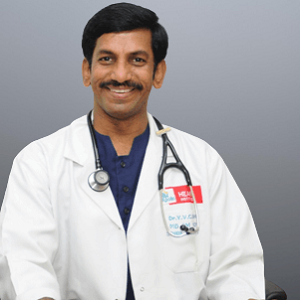Best Doctors in India for Cardiac Ablation
- Interventional Cardiologist, New Delhi, India
- Over 23 years experience
Profile Highlights:
- Dr. Amit Mittal is a cardiologist working at Indraprastha Apollo Hospital in New Delhi with experience of over 23 years in Interventional Cardiology.
- He is good to consult for Angiogram, Angioplasty, and Bypass Surgery. Dr. Mittal has performed over 15,000 cardiac procedures till now. He offers services like EPS and RFA procedures, pacemaker implantation, ECG, complex surgery of heart valve replacement, and angina treatment, to name a few.
- Apart from that, Dr. Mittal won a Gold medal in MBBS 1st y and for the highest marks in obstetrics and gynecology. He published many papers in national and international medical journals and chapters in textbooks.
- Cardio Thoracic & Vascular Surgeon, New Delhi, India
- Over 30 years’ experience
Profile Highlights:
- Dr. Bhaba Nanda Das is a well-known cardiovascular and cardiothoracic surgeon and has performed the first Coronary Artery Bypass Grafting (CABG) on a beating heart in India.
- He has performed over 20,000 cardiac surgeries and does more than 800 cardiac surgeries annually.
- With a keen interest in cardiovascular and thoracic procedures, Dr. Das is the first cardiac surgeon to use all arterial grafts for multiple coronary revascularizations. He was also the first to use coronary sinus in Fontan’s circulation.
- Vascular Surgeon and Interventional Cardiologist, Gurugram, India
- Over 30 years’ experience
Profile Highlights:
- Dr. T S Kler is undoubtedly one of the best vascular surgeons not only in India but also abroad. He has performed more than 25,000 Surgeries in his life which makes him stand where he is.
- He is a pioneer in electrophysiology & he established the first dedicated Electrophysiology department in India at Fortis Escorts Heart Institute.
- Dr. T S Kler initiated a radio Frequency Ablations programme at Escorts in 1993, one of the first of its kind in India. He was the first doctor in India to implant an ICD, CRT-P & CRT-D.
- Cardio Thoracic & Vascular Surgeon, New Delhi, India
- Over 30 years’ experience
Profile Highlights:
- Dr. Ajay Kaul is a leading name in the field of Cardiothoracic and Vascular Surgery in India with over 3 decades of experience.
- He specializes in Coronary Bypass surgery and is one of the best with the highest number of total arterial coronary bypass surgery (4000+) by using two internal mammary arteries from the chest and without any cuts on arms and legs.
- He is also an expert in minimally invasive cardiac surgeries (MICS) and has performed more than 4000 MICS which is the highest by any cardiac surgeon in India.
- Cardiologist, New Delhi, India
- Over 32 years’ experience
Profile Highlights:
- Dr. Balbir Singh is a reputed cardiologist with over 32 years of experience, considered a veteran in his field, both nationally and internationally.
- He has also pioneered several minimally invasive cardiology surgical techniques in India and has been honored with the prestigious Padma Shree Award for his exceptional performance.
- “LIMCA” Book of Records also highlighted Dr. Balbir Singh’s contribution to the medical field in the Indian Electrophysiology Journal.
- Interventional Cardiologist, New Delhi, India
- Over 30 years’ experience
Profile Highlights:
- Dr. Ashok Seth is one of the most well-known Interventional Cardiologists in India honored with both the Padma Shri and Padma Bhushan by the Government of India.
- He has more than 3 decades of experience in interventional cardiology and has performed over 20, 000 angioplasties and 50,000 angiograms till date.
- Dr. Seth holds a Fellowship of the Royal College of Physicians of Ireland, London, and Edinburgh along with several other degrees to his name.
- Interventional Cardiologist, New Delhi, India
- Over 20 years’ experience
Profile Highlights:
- Dr. Praveer Aggarwal is a nationally acclaimed and highly professional Interventional Cardiologist.
- His specialization lies in the treatment of blockages of the coronary and peripheral arteries and is an expert in Rotational and Directional atherectomy, intravascular ultrasound, pressure wire, and the use of Drug Eluting Stents.
- Along with his team at Fortis Escorts Heart Institute, Dr. Aggarwal performs close to 2000 angiographies and over 2000 coronary interventions including coronary angioplasties every year.
- Interventional Cardiologist, Gurugram, India
- Over 27 years’ experience
Profile Highlights:
- Dr. Manjinder Sandhu is a leading interventional cardiologist based in Gurugram who holds an extensive experience of over 27 years in the field.
- His primary interest lies in Complex Coronary Interventions, Trans-radial Interventions, and Balloon Valvuloplasty, and has performed a large number of such procedures in his career mainly while serving in the Army Medical Corps.
- Dr. Sandhu has been teaching and training postgraduate students in Cardiology and Medicine and has been a guide to several successful cardiologists in India.
- Interventional Cardiologist, New Delhi, India
- Over 20 years’ experience
Profile Highlights:
- Dr. Subhas Chandra is a leading Interventional Cardiologist who holds close to 20 years of experience and specializes in coronary interventions, endovascular interventions, device implantation, and structural heart diseases.
- He has performed more than 25,000 coronary interventions (complex angioplasty and rotablation), 4000+ for structural heart diseases, and has done more than 3000 permanent pacemaker implants.
- Interventional Cardiologist, Chennai, India
- Over 25 years’ experience
Profile Highlights:
- Dr. Y Vijayachandra Reddy is an interventional cardiologist with 25+ years of experience.
- Dr. Reddy’s work experience includes more than 7000 PCIs, 30000 invasive procedures, 550 PCIs in cardiogenic shock, 700 Cardiac devices, 400 PTMCs, and several EVAR and TEVAR procedures.
- His expertise lies in pacemaker implantations, pediatric interventions, ICDs, CRTs, endovascular repairs, and more.
Best Hospitals in India for Cardiac Ablation
Fortis Escorts Hospital, New Delhi
- City: New Delhi, India
Hospital Highlights:
- Over the last 33 years, the Fortis Escorts Heart Institute has set new standards in cardiac treatment with groundbreaking research. It is now known around the world as a centre of expertise for Cardiac Bypass Surgery, Interventional Cardiology, Non-invasive Cardiology, Paediatric Cardiology, and Paediatric Cardiac Surgery.
- The hospital has cutting-edge laboratories that perform a wide range of diagnostic tests in Nuclear Medicine, Radiology, Biochemistry, Haematology, Transfusion Medicine, and Microbiology.
- Fortis Escorts Heart Institute boasts a diverse group of bright and experienced doctors who are backed up by a team of highly qualified, experienced, and devoted support professionals as well as cutting-edge equipment such as the recently installed Dual CT Scan.
- Approximately 200 cardiac doctors and 1600 personnel currently collaborate to manage over 14,500 admissions and 7,200 emergency situations each year. The hospital now has a 310-bed infrastructure, as well as five cath labs and a slew of other world-class amenities.
Rela Hospital, Chennai
- City: Chennai, India
Hospital Highlights:
- RIMC is a multi-specialty hospital in a sprawling area of 36 acres located in Chromepet, Chennai, Tamil Nadu, India.
- The facility has 450 beds including 130 critical care beds, 9 operating rooms, modern reference laboratories and radiology services, and is conveniently located near road, rail and air transportation.
- RIMC is led and managed by world-renowned physicians committed to healthcare.
- RIMC offers the broadest range of clinical care, education, and research. The hospital offers state-of-the-art technology and modern treatment facilities designed to provide health care at an affordable cost.
- Rela Institute is driven by patient needs, comfort and confidence.
CARE Hospitals, Hyderabad
- City: Hyderabad, India
Hospital Highlights:
- CARE Hospitals were established in the year 2000, by CARE Group.
- The multispecialty hospital has 435 beds, including 120 critical care beds, with an annual inflow of 180000 outpatients and 16,000 in-patients.
- The hospital provides specialty medical services in Cardiology, Cardiothoracic Surgery, Pediatric Cardiology, Pediatric Cardiothoracic Surgery, Neurology, Neurosurgery, Nephrology, and Urology.
- The hospital has the first dual source, 128 slice CT scanner (for high precision cardiac imaging) – the first of its kind in south India.
- The hospital offers a wide range of accommodation facilities for the convenience of its varied patient base, ranging from general wards to super deluxe rooms.
Fortis Hiranandani Hospital, Mumbai
- City: Mumbai, India
Hospital Highlights:
- Fortis Hiranandani hospital was established in 2007.
- The hospital is an advanced tertiary care, multi-specialty hospital equipped with 149 beds.
- The hospital is equipped with a super ICU to provide emergency medical care to critically ill patients.
- The hospital is NABH accredited.
- The critical care facility in the hospital is augmented with the state-of-the-art facilities that facilitate speedier diagnosis and efficient monitoring.
- The hospital provides specialty medical services in cardiology, orthopedic science, pediatric science, neurology, diabetic care, urology, nephrology, ENT, obstetrics, gynecology, cosmetic surgery, bariatric surgery, neuro and spine care.
Fortis Hospital, Anandpur, Kolkata
- City: Kolkata, India
Hospital Highlights:
- Fortis Hospital, Anandapur, Kolkata is a world-class super-speciality equipped with the latest technologies in the medical world.
- The hospital is NABH accredited.
- This state-of-the-art facility specializes in cardiology and cardiac surgery, urology, nephrology, neurosciences, orthopaedics, digestive care, emergency care and critical care.
- The hospital, governed by integrated Building Management System (IBMS), has a pneumatic chute system, for quick vertical and horizontal transportation between floors, facilitating speedy transfer of patient specimens, documents, reports, and medicines to the concerned departments.
- The hospital also has a nephrology department with over 28 advanced dialysis units.
Fortis Hospital Banerghatta, Bengaluru
- City: Bengaluru, India
Hospital Highlights:
- Fortis Hospital Bannerghatta, Bengaluru was established in 2006.
- The hospital is a 276 bedded multi-specialty tertiary care facility.
- The hospital specializes in cutting-edge medical technology and dedicated patient care services.
- The hospital is equipped with state-of-the-art technologies like trans-radial angioplasty, trans-abdominal cardiac surgery, and computerized TKR navigation surgery.
- The hospital provides specialty medical services in cardiology, cardiac surgery, orthopedics, neurology, neuro-surgery, GI, and Minimal Access Surgery (MAS).
Fortis Hospital, Malar, Chennai
- City: Chennai, India
Hospital Highlights:
- Fortis Malar was established in 1992 and was formerly known as Malar Hospital.
- The hospital specializes in cutting-edge medical technology and dedicated patient care services.
- The hospital is multi-specialty, tertiary care facility with 180 beds.
- The hospital offers comprehensive medical care in specialties such as cardiology, cardio-thoracic surgery, neurology, neurosurgery, orthopedics, nephrology, gynecology, gastroenterology, urology, pediatrics, and diabetes.
Gleneagles Global Hospital, Parel, Mumbai
- City: Mumbai, India
Hospital Highlights:
- Gleneagles Global Hospital The 450-bed facility comprises of 17-stories, housing state-of-the-art infrastructure, and advanced medical care facilities.
- The hospital offers end-to-end clinical, surgical, and diagnostic services. It is equipped with a team of eminent medical professionals aided by qualified nurses and medical staff
- The Hospital offers advanced Endoscopic procedures, Hepatobiliary and Liver Surgeries, Surgical and Medical Gastroenterology, Bariatric Surgery, and Robotic surgery.
- The hospital is a center of excellence for Orthopedics, Joint Replacement, Knee Replacement, and Hip Replacement surgery.
Jaypee Hospital, Noida
- City: Noida, India
Hospital Highlights:
- Jaypee Hospital is the flagship hospital of the Jaypee Group.
- This hospital has commissioned 525 beds in the first phase and has been planned and designed as a 1200 bedded multi-specialty facility.
- It holds the accreditation of the NABH and NABL.
- The hospital has state-of-the-art infrastructure equipped with the latest technologies and modern equipment like 64 Slice PET CT, Dual Head 6 Slice SPECT CT, Gamma Camera, and Da Vinci Robotic Surgery for comprehensive robotic surgical solutions.
- It has special Centers dedicated to the major specialties to provide hassle-free and high-quality clinical care.
Manipal Hospital, Dwarka, Delhi
- City: New Delhi, India
Hospital Highlights:
- Manipal Hospitals, Dwarka, is a super-specialty hospital in Dwarka, New Delhi, which is a part of Manipal Hospitals Group.
- The hospital aims to provide the best treatment on par with international standards at a fraction of the cost.
- Equipped with 380 beds, the hospital is also one of the new age hospitals which are equipped fully with state-of-the-art infrastructure, cutting-edge technology as well as the latest and advanced clinical practices. The hospital also has 13 modular Operation theatres with 118 beds which are solely meant for critical care.
- The hospital comprises internationally acclaimed doctors and highly professional and experienced hospital and medical staff who are able to provide preventive, therapeutic, and diagnostic services all under one roof.
Cardiac Ablation
Cardiac Ablation is a procedure that involves the use of energy for making small scars in the tissues of your heart. The energy stops unusual electrical signals that are moving through the heart and causing uneven heartbeat or arrhythmia. The procedure treats atrial fibrillation which is a type of irregular heartbeat. Your doctor will perform Cardiac Ablation if the medications and heartbeat resetting (also called cardioversion) fail to work.
Types of Cardiac Ablation
There are two ways of performing ablation. Catheter ablation is a more common one of the two. The other name for Cardiac Ablation is radiofrequency or pulmonary vein ablation. This isn’t a surgical procedure. Your doctor will put a catheter (a thin, flexible tube) into the blood vessels of your neck or leg to guide it to the heart. When the tube reaches the area causing arrhythmia, it will destroy the cells responsible for the same. This makes your heartbeats regular.
- Radiofrequency ablation– The doctor will send radiofrequency energy with the help of catheters to make circular scars around the veins or each group of veins.
- Cryoablation- The doctor will use a single catheter to send a balloon that has material tipped for freezing the tissues and cause a scar.
Types of cardiac surgical ablation : Surgical ablation will involve cutting your chest to gain access.
- Maze procedure- Your doctor will perform this while you are undergoing open-heart surgery for bypass or valve replacement. He or she will make small cuts in the upper portion of your heart while stitching them together to form a scar that stops unusual signals.
- Mini maze- In most cases, people with atrial fibrillation don’t require n heart surgery. Here the need for this procedure arises. Your doctor will make multiple cuts between the ribs while using a camera to perform catheter ablation.
- Convergent procedure- It involves catheter ablation with a mini-maze procedure.
Why it's done?
The procedure helps to correct the problems with heart rhythm. The electrical impulses causing the contraction of your heartbeats must follow a specific pathway through the heart. Arrhythmia or abnormal heartbeat happens due to an interruption in these impulses that are treatable with Cardiac Ablation. Cardiac Ablation is the right option for those who:
- Tried medications for arrhythmia but didn’t get any results
- Had serious side effects because of medications that treat arrhythmia
- Are at a high risk of complications due to arrhythmia
Benefits
Preparation
What to expect?
During the procedure
Your doctor will perform the procedure in the hospital. The nurse will place an IV line in your forearms before beginning the procedure and give you a sedative so that you relax. Your doctor might use general anesthesia instead to make you fall asleep. Your doctor will numb the area near your neck, groin, or forearm after the effects of the sedative set in. The team will then insert a needle into your vein while placing a sheath through this needle.
This is followed by threading the catheters through your sheath and guiding them to various places in your heart. Next, they will inject a dye into the catheter that allows your doctors to see the blood vessels and heart using x-ray imaging. Electrodes are present at the tip of the catheters that help to send electrical impulses to your heart and record the electrical activities of your heart. This process involving tests and imaging for determining the cause of arrhythmia is known as electrophysiology study (EP study). The doctors perform this before Cardiac Ablation to check the most effective way of treating arrhythmia.
Upon identifying the abnormal heart tissue responsible for causing heart arrhythmia, your doctor will direct the catheter tips towards the abnormal tissue of your heart. The catheter tips will allow the energy to create scars and destroy the tissue causing the arrhythmia. Ablation might block electrical signals traveling through the heart so that the abnormal rhythm stops while allowing signals to travel in a normal pathway. The procedure takes around 4 to 5 hours but it may take longer if the procedure is complex.
After the procedure
The nurse will move you to a recovery area so that you can rest quietly for 5 to 6 hours and there is no bleeding at the catheter site. The team will monitor your heartbeat and blood pressure to check if there are any complications. You can go back home on the same day as the procedure if you are in a good condition. However, you may need to stay overnight if your case is complex. Although you may experience soreness, it will hardly last a week. You will also be able to perform routine activities after some days of the procedure.
Results
Risks
The risks associate with Cardiac Ablation are:
- Bleeding on the site of insertion of a catheter
- Infection
- Arrhythmia due to damage to the electrical system of your heart
- Damage to your heart
- Narrowing of the veins present between the heart and the lungs
- Radiation
- Damaged heart valves
- Damage to the blood vessels due to scraping
- Radiation
- Heart attack
- Blood clots in your lungs or legs
- Kidney damage because of the dye
- Stroke
- Death

